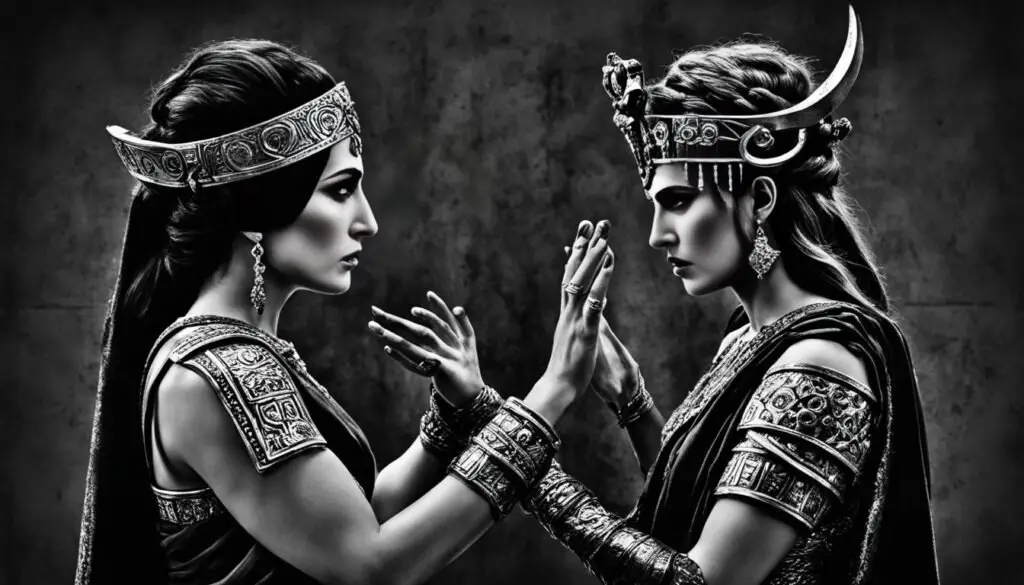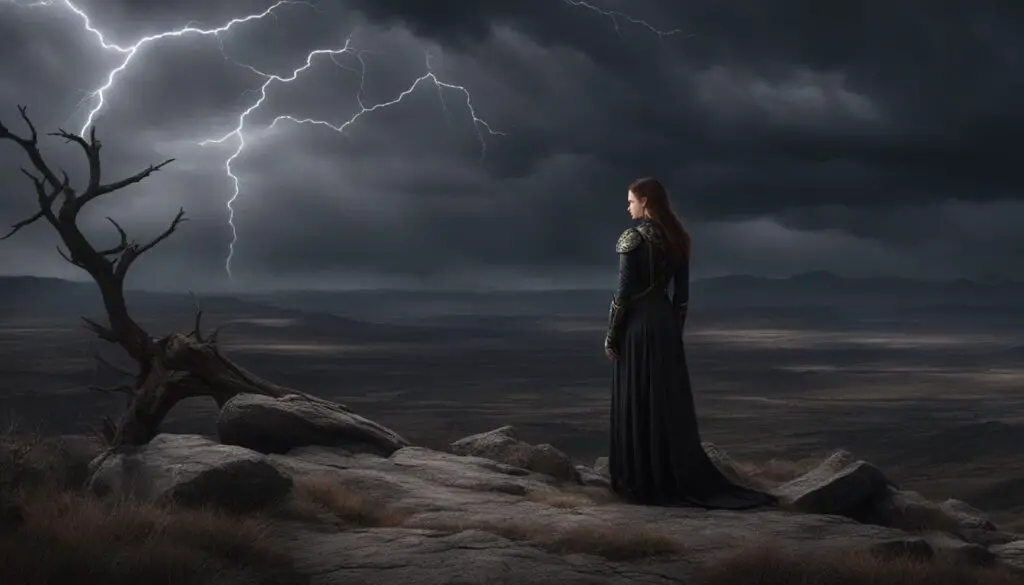The story of Electra in Greek mythology is a tale of betrayal, revenge, and tragedy within her own family. As the daughter of Agamemnon and Clytemnestra, Electra’s life is marred by a curse that unfolds in a series of unfortunate events.
Upon her father’s absence during the Trojan War, Electra’s mother succumbs to infidelity and seizes the throne, plunging their family into turmoil. The murder of Agamemnon upon his return further fuels Electra’s anger and desire for justice. To distance her from the palace, Electra is married off to a shepherd, intensifying her despair over the loss of her presumed dead brother, Orestes.
However, fate reunites Electra and Orestes, leading them to plot their revenge against their mother and her lover. In this quest, Electra plays a pivotal role, providing unwavering support and encouragement to Orestes. Together, they seek to avenge their father’s death and restore justice to the House of Atreus.
Key Takeaways:
- Electra is a tragic figure in Greek mythology.
- Her story revolves around betrayal and revenge within her own family.
- She is the daughter of Agamemnon and Clytemnestra.
- Electra’s life is marked by her father’s absence, her mother’s infidelity, and the murder of her father upon his return.
- She plays a pivotal role in seeking revenge against her mother and her lover.
The Story of Electra in Greek Mythology
Electra, a prominent figure in Greek mythology, was the daughter of Agamemnon and Clytemnestra. Her tragic tale unfolds amidst familial betrayal and vengeance.
When Agamemnon left for the Trojan War, Clytemnestra took a lover and seized the throne, leaving Electra enraged by her mother’s treachery. Upon Agamemnon’s return, he was mercilessly slain by Clytemnestra. To keep Electra away from the palace, Clytemnestra married her off to a shepherd, further isolating and tormenting her.
In some versions of the story, Electra believed her beloved brother Orestes to be dead, grieving for him in paintings where she is depicted holding a mourning urn.
Eventually, fate reunites Electra and Orestes, igniting a plan to avenge their father’s murder. They devise a scheme to kill Clytemnestra and her lover. While Orestes delivers the final blow in the theatrical adaptations, Electra serves as his unwavering support and encouragement throughout their quest for justice.
The story of Electra has captured the imagination of playwrights, directors, and artists throughout the ages, finding expression in various theatrical productions and artistic works. Its enduring significance and modern adaptations continue to showcase the timeless appeal of Electra’s tragic and vengeful journey.
Electra’s Family and Betrayal

Electra’s origins lie within the complex web of her family dynamics. As the daughter of Agamemnon and Clytemnestra, her life becomes entangled in a tragic tale of betrayal and power struggles.
When her father leaves for the Trojan War, her mother seizes the opportunity to take on a lover and usurp the throne, causing immense anger and resentment in Electra. The ultimate betrayal occurs upon Agamemnon’s return, as Clytemnestra executes a plan to murder him, consolidating her power and solidifying the curse that shadows their family.
Electra, forced into a marriage with a shepherd to keep her at a distance from the palace, is consumed by grief, believing her brother Orestes to be dead. Electra’s life is marked by the tension between her love for her father and her rage towards her mother.
Power struggles and familial betrayal
- Agamemnon’s departure for the Trojan War leads to Clytemnestra’s infidelity and the usurpation of the throne.
- Clytemnestra executes a plan to murder Agamemnon upon his return, consolidating her power.
- The tension between love for her father and rage towards her mother consumes Electra.
Electra’s family history is fraught with power struggles, infidelity, and betrayal. These events shape her destiny and drive her relentless pursuit of revenge.
Electra’s Exile and Mourning

After her mother’s treacherous actions, Electra was forcibly separated from her rightful place in the palace and married off to a shepherd. This exile served as a means for Clytemnestra to weaken Electra’s resolve and distance her from any potential threats to her rule. Stripped of her status and forced into a life far removed from the opulence she once knew, Electra’s days were filled with sorrow and mourning.
In some versions of the tale, Electra was led to believe that her beloved brother, Orestes, had met his demise. This devastating news compounded her grief, and she was often depicted holding an urn in mourning for her brother.
The loss of her family, coupled with her unjust exile, fueled Electra’s desire for revenge against her mother and her lover, who had wronged their family so profoundly. Electra’s exile and mourning demonstrate the deep pain she endured throughout her life. Isolated from her rightful place, and mourning the loss of her brother, Electra’s emotional turmoil only intensified her burning need for justice and retribution.
Electra and Orestes Reunited
After years of separation and turmoil, Electra and her presumed dead brother, Orestes, finally reunite to embark on a quest for revenge against their mother and her lover. The siblings, bound by their shared desire to avenge their father’s murder, join forces and devise a plan to execute their ruthless plot.
United by their tragic past and driven by a thirst for justice, Electra becomes a pillar of support and encouragement for Orestes throughout their endeavor. Her unwavering loyalty and determination fuel their mission, as they prepare to take matters into their own hands and bring retribution upon the perpetrators of their family’s suffering.
The reunion of Electra and Orestes signifies a turning point in their lives, as they transform from victims of betrayal into formidable agents of vengeance. Their collaborative efforts highlight the strength of their bond and the undeniable influence they hold over each other. Together, they become the driving force behind their father’s justice, forever etching their names in the annals of Greek myth and tragedy.
FAQ
Who is Electra in Greek mythology?
Electra is a prominent figure in Greek mythology. She is the daughter of Agamemnon and Clytemnestra, and her story revolves around betrayal and tragedy within her own family.
What is the story of Electra in Greek mythology?
The story of Electra in Greek mythology is filled with betrayal and tragedy. Her father’s absence during the Trojan War leads to her mother’s infidelity and the usurpation of the throne. The murder of Agamemnon upon his return further fuels Electra’s anger. Married off to a shepherd in an attempt to distance her from the palace, Electra’s despair grows as she mourns the loss of her presumed dead brother, Orestes. These circumstances set the stage for their eventual reunion and their plot to avenge their father’s death by killing their mother and her lover.
What is Electra’s role in Greek mythology?
Electra plays a pivotal role in Greek mythology as the daughter of Agamemnon and Clytemnestra. She becomes a central figure in the mythological tale of the House of Atreus, where betrayal and revenge shape her life. Her unwavering support and encouragement for her brother Orestes during their quest for vengeance demonstrate her resilience and determination.
How does Electra’s exile and mourning contribute to her story?
Electra’s exile and mourning are key elements in her story. After her mother’s treacherous actions, she is forcibly separated from her rightful place in the palace and married off to a shepherd as a means to weaken her resolve. This exile and loss further fuel her desire for revenge against her mother and her lover, who had wronged their family so profoundly.
How does Electra’s reunion with Orestes impact their quest for revenge?
The reunion of Electra and Orestes ignites their shared quest for revenge against their mother and her lover. United by their tragic past and driven by a thirst for justice, they join forces and devise a plan to execute their ruthless plot. Electra serves as Orestes’ unwavering support and encouragement throughout their endeavor, highlighting the strength of their bond and their determination to bring retribution upon the perpetrators of their family’s suffering.




